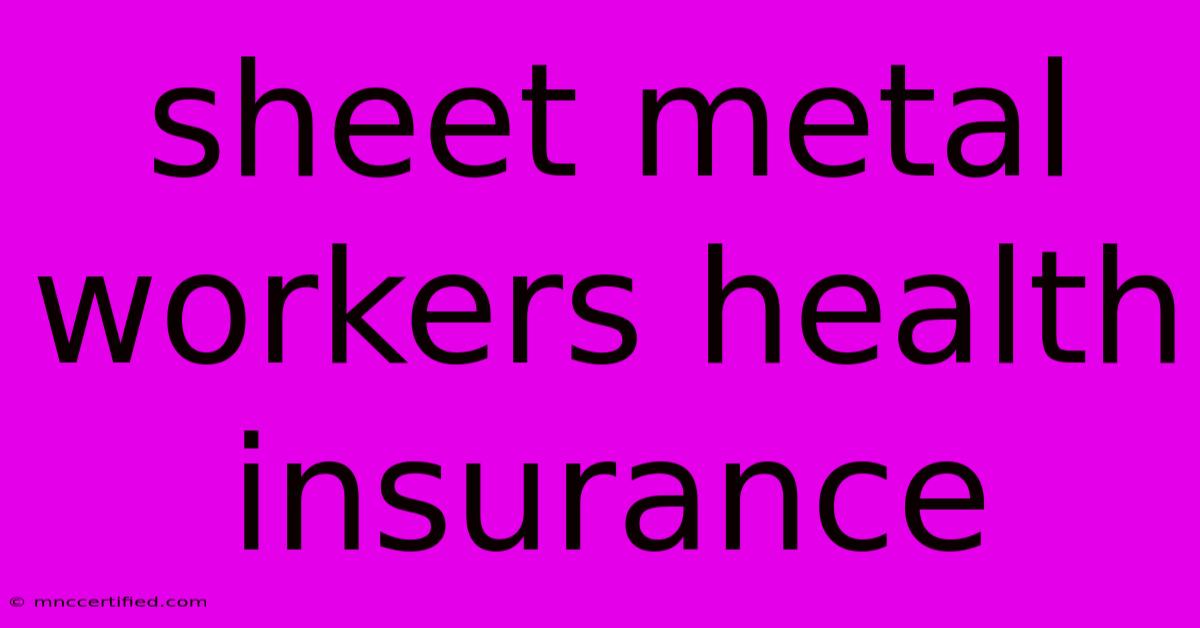Sheet Metal Workers Health Insurance

Table of Contents
Navigating the World of Sheet Metal Workers Health Insurance: A Comprehensive Guide
Sheet metal workers, renowned for their precision and skill, often work in demanding environments. Maintaining good health is crucial for their well-being and career longevity. This guide delves into the intricate world of sheet metal workers health insurance, offering insights into available options, key considerations, and tips for finding the best coverage.
Understanding Sheet Metal Workers' Unique Needs
The sheet metal industry presents specific health risks that necessitate tailored insurance solutions. Workers are exposed to various hazards, including:
- Dust and fumes: Sheet metal fabrication processes can generate fine particles that can irritate the lungs and cause respiratory problems.
- Noise: Constant exposure to loud machinery can lead to hearing loss.
- Ergonomic issues: Repetitive movements and awkward postures can result in musculoskeletal disorders.
- Height hazards: Working at elevated heights carries inherent risks of falls.
Types of Health Insurance for Sheet Metal Workers
Sheet metal workers have several avenues to secure health insurance:
1. Union-Sponsored Plans:
- Many sheet metal workers are members of unions like the Sheet Metal Workers' International Association (SMWIA).
- These unions often negotiate group health insurance plans with reputable providers, offering comprehensive coverage at competitive rates.
- Benefits: Group plans often come with lower premiums, negotiated discounts, and a wider network of healthcare providers.
- Considerations: Coverage may vary depending on the specific union and its negotiated contract.
2. Employer-Sponsored Plans:
- Many sheet metal companies offer health insurance plans as a benefit to their employees.
- Benefits: Employers often contribute towards premiums, making coverage more affordable.
- Considerations: Coverage may vary based on the company's size, industry, and available plans.
3. Individual Health Insurance Plans:
- Workers can purchase individual health insurance plans through the Affordable Care Act (ACA) marketplace or directly from private insurance providers.
- Benefits: This option offers flexibility in choosing a plan that best suits individual needs and budget.
- Considerations: Premiums can be higher than group plans, and coverage may be more limited.
Key Factors to Consider When Choosing Health Insurance
1. Coverage:
- Deductible: The amount you pay out-of-pocket before insurance starts covering costs.
- Coinsurance: The percentage you pay for covered medical services after meeting the deductible.
- Copayments: Fixed fees you pay for specific services like doctor visits.
- Prescription drug coverage: Essential for managing chronic conditions and accessing medications.
- Mental health and substance abuse coverage: Crucial for addressing mental well-being.
2. Provider Network:
- Ensure the plan covers doctors, hospitals, and specialists you trust in your local area.
- Look for plans with wide networks for greater flexibility in accessing care.
3. Premiums and Costs:
- Compare monthly premiums from different plans.
- Evaluate out-of-pocket costs like deductibles, coinsurance, and copayments.
- Consider annual limits on coverage and any exclusions.
4. Health Savings Account (HSA):
- HSAs allow you to save pre-tax money for healthcare expenses.
- Combine an HSA with a high-deductible health plan to potentially save on overall costs.
Tips for Finding the Best Health Insurance for Sheet Metal Workers
- Consult your union: If you're a member, leverage your union's expertise and negotiated plans.
- Explore your employer's options: Inquire about available benefits and their cost-sharing contributions.
- Use online comparison tools: Websites like healthcare.gov and eHealth can help compare different plans.
- Seek advice from a broker: An independent insurance broker can provide personalized guidance and help you navigate the complex options.
- Read plan documents carefully: Fully understand coverage details, exclusions, and costs before making a decision.
Maintaining Health and Well-being: Beyond Insurance
- Regular medical checkups: Stay proactive with preventive care to detect potential health issues early.
- Wear protective gear: Use appropriate safety equipment to minimize exposure to hazards.
- Maintain healthy habits: Engage in regular exercise, eat a balanced diet, and manage stress levels.
By taking a proactive approach to health insurance and preventive care, sheet metal workers can ensure they have the coverage and support they need to stay healthy and productive throughout their careers.

Thank you for visiting our website wich cover about Sheet Metal Workers Health Insurance. We hope the information provided has been useful to you. Feel free to contact us if you have any questions or need further assistance. See you next time and dont miss to bookmark.
Featured Posts
-
Dow Closes At Record High Tesla Stock Update
Nov 12, 2024
-
Yellowstone Says Goodbye To Kevin Costner
Nov 12, 2024
-
Gary Linekers Bbc Tenure Ends In 2026
Nov 12, 2024
-
How Much Does It Cost To Buy A Lion
Nov 12, 2024
-
Singles Day Consumers Less Eager To Spend
Nov 12, 2024